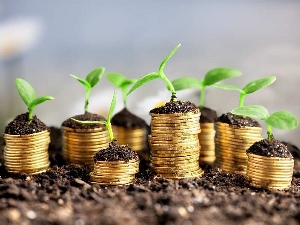The country’s bid to address the escalating impacts of climate change on its agricultural sector is threatened by a widening climate finance gap estimated at some US$ 14.25 billion annually.
This huge financing gap, as revealed by Chief of Party, Feed the Future Ghana Mobilizing Finance in Agriculture (MFA) Activity, Dr. Victor Antwi, raises concerns about the country’s ability to implement robust measures to safeguard its agricultural sector, which is already grappling with the adverse effects of climate change.
Referencing a study by Pangea Global Ventures, which shows that only five percent of Ghana’s US$15 billion climate finance requirements are met annually, he acknowledged the magnitude of work to be done to ensure adequate adaptation and mitigation of the severe consequences of climate shifts.
“To bridge this gap, stakeholders must widely share information on the effects of climate change on Ghana’s agriculture and other sectors of the economy. More importantly, climate capital providers, apart from living up to their mandates by ensuring sustained flow of climate capital to Ghana’s public and private sectors, must share best practices for replication,” he said.
Dr. Antwi, who spoke at the opening session of a three-day USAID Climate Finance Conference in Accra, noted that the agricultural sector faces tremendous risk from the worsening impacts—increased temperatures, changing precipitation patterns, and rising frequency of extreme weather events—of climate change.
These developments, he said, threaten global food security and the livelihoods of farmers worldwide if agricultural systems are not equipped to become more resilient.
He further indicated that there are major barriers that hinder the flow of climate finance toward building resilience in agriculture, from difficulties in designing bankable projects to challenges in smallholder farmers accessing finance, adding that investments are not flowing at the pace and scale needed.
Rising temperatures, erratic rainfall patterns, and extreme weather conditions decrease the yields of farmers who depend on rain-fed farming. These impacts have significant implications for the country’s economy, food security, jobs, and livelihoods, he stated.
To address these challenges, he called on stakeholders to adopt an integrated approach to climate finance and action on agriculture. “We need to adapt Ghana’s agricultural systems to climate change impacts, adopt mitigation measures to reduce emissions from the sector, and build resilience for the future.”
The USAID Climate Finance Conference is being hosted by the Feed the Future Ghana Mobilizing Finance in Agriculture (MFA) Activity in collaboration with Policy LINK, Market Systems and Resilience and Africa Trade and Investment Activities.
The event is under the theme ‘Climate Financing in Ghana: Mobilising Resources for Adaptation and Mitigation’.
Over the course of the three-day event, key stakeholders in the agriculture finance sector – public and private sector – and development partners will come together to share information on climate action, resources, lessons learned and best practices.
It also provides a platform to strategise on how to attract investment to help better manage climate risks and mitigate its effects.
The event will feature plenary presentations on the global climate financing landscape, carbon markets, finance, policies, programmes and lessons to improve the design of interventions by government and development partners.
The USAID-supported Feed the Future Ghana Mobilising Finance in Agriculture has been at the forefront in securing US$234.44 million between October 2020 and January 2024.
So far, a significant portion of this funding is said to have reached smallholder farmers and microentrepreneurs.
Moreover, initiatives like the US$ 2.77 million COVID-19 Relief and Resilience Challenge Fund are also noted to have played a crucial role in aiding predominantly women smallholder farmers, further solidifying USAID’s commitment to sustainable and inclusive climate finance.
Also speaking at the event, the Mission Director of USAID-Ghana, Kimberly Anne Rosen, reckoned that responding adequately and sufficiently to the climate crisis will help protect valuable natural resources while providing the opportunity for vulnerable people globally to adopt new benefits from new approaches and economic opportunities.
She described Ghana as a leader in combating climate change and the second country in Africa after Mozambique to receive payments from the World Bank trust fund for reducing emissions from deforestation and forest degradation.
However, she also alluded that the country falls short of the resources required to meet its Nationally Determined Contributions (NDCs) under the Paris Climate Agreement.
Among others, Madam Anne Rosen reiterated USAID’s commitment to advancing ambitious actions to confront the climate crisis.
Business News of Thursday, 22 February 2024
Source: thebftonline.com
Economy faces US$14.25 billion annual climate finance deficit
 This financing gap raises concerns about the need to adopt robust measures to safeguard agric sector
This financing gap raises concerns about the need to adopt robust measures to safeguard agric sector












